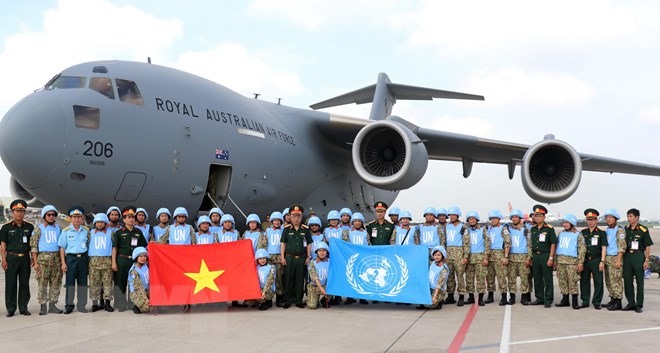 Politics & Law
Politics & Law

Capacity building is the key to Việt Nam in enhancing its United Nations (UN) peacekeeping operations, said Farooque Choudhury, an expert from UN Department of Peacekeeping Operations – Department of Field Support yesterday.
 |
| Capacity building is the key to Việt Nam in enhancing its United Nations (UN) peacekeeping operations. — VNA/VNS Photo Xuân Khu |
HÀ NỘI — Capacity building is the key to Việt Nam in enhancing its United Nations (UN) peacekeeping operations, said Farooque Choudhury, an expert from UN Department of Peacekeeping Operations – Department of Field Support on Friday.
"As a new country contributing troops, Việt Nam faces financial challenges in terms of investment in major equipment, providing training and developing infrastructure for building training capacity," he said while presenting a discussion paper at the first ever international conference on Việt Nam’s peacekeeping operations held in Hà Nội.
"In order to achieve a high degree of professionalism and motivation in peacekeeping operations, Việt Nam needs to focus on enhancing language skills for the deployed forces and completing a legal and policy framework," he recommended.
Việt Nam should strengthen the specialised management mechanism of Việt Nam’s Department of Peacekeeping Operations both in scale and function. The department needs to become a national focal point in the training, dispatch and management of all peacekeeping operation forces including police and civilian, according to the expert.
Since 2014, Việt Nam has deployed 29 officers to UN Peacekeeping Operations in South Sudan and the Central African Republic. In 2017, Việt Nam sent its first female officer, Major Đỗ Thị Hằng Nga, to the UN peacekeeping mission in South Sudan.
On October 1 this year Việt Nam deployed its first level-two field hospital contingent to the UN Mission in South Sudan.
Senior Lieutenant General Nguyễn Chí Vịnh, Deputy Minister of National Defence said that Việt Nam’s peacekeeping operations have made important contributions to the country’s multilateral diplomacy, demonstrating its responsibilities to the international community as well as contributing to regional and global peace.
Việt Nam would not have been able to carry out peacekeeping missions without international support, he said, hoping to continue to receive equipment, training and transportation from countries such as the US, UK, Canada, France, Australia, Japan and the Republic of Korea.
“Việt Nam is willing to share experience and resources with other countries, especially those from ASEAN, in building a peacekeeping co-ordination centre in Việt Nam,” he said.
What Việt Nam needs to do in the future is to continue to effectively perform deployment missions and prepare for rotation of deployment for the second level-two field hospital, according to Vịnh.
Kamal Malhotra, UN Resident Co-ordinator and UNDP Resident Representative in Việt Nam said “Việt Nam has obviously contributed more and more significantly to global peacekeeping.”
The priority areas that Việt Nam should pay attention to in future deployments are medicine, engineering, construction, logistics, military observers and individual police officers, he said.
He affirmed that the UN would continue to assist Việt Nam in capacity building; mobilising and co-ordinating resources from international and national development partners; long-term strategic advice and support to develop Việt Nam’s peacekeeping training centre to become a regional centre.
According to the national defence ministry’s Department of Peacekeeping Operations, Việt Nam intends to scale up its involvement in UN Peacekeeping Operations in non-combat fields including engineering, construction, logistics, de-mining and medicine. By 2020 the country will dispatch a peacekeeping military engineering unit. — VNS




